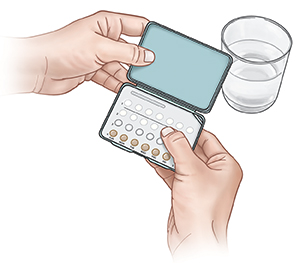Birth control pills contain hormones that help prevent pregnancy. The pills are prescribed by your healthcare provider. There are many types of birth control pills available. If you have side effects from one type of pill, tell your healthcare provider. They may be able to prescribe a pill that works better for you.
Pregnancy rates
Talk to your healthcare provider about the effectiveness of this birth control method.
Using the pill
-
Take 1 pill daily. Take it at around the same time each day.
-
Follow your healthcare provider’s guidelines on when to start your first pack of pills. You may need to use another form of birth control for a week or more after you start.
-
Know what to do if you forget to take a pill. (Contact your healthcare provider or check the package.) If you miss more than 1 pill, you may need to use a backup method of birth control for a week or more.
Pros
-
Low pregnancy rate
-
No interruption to sex
-
Easy to use
-
Can help make periods more regular
-
May lower your risk of ovarian cysts and certain cancers
-
May decrease menstrual cramps, menstrual flow, and acne
Cons
-
Does not protect against sexually transmitted infections (STIs)
-
Requires taking a pill on time each day
-
May not work as well when taken with certain other medicines (check with your pharmacist)
-
May cause side effects such as nausea, irregular bleeding, headaches, breast tenderness, fatigue, or mood changes (these often go away within 3 months)
-
May increase the risk of blood clots, heart attack, and stroke
The pill may not be for you
The pill may not be for you if:
-
You are a smoker and over age 35
-
You have high blood pressure or gallbladder, liver, cerebrovascular or heart disease
-
You have diabetes, migraines, blood clot in the vein or artery, lupus, depression, certain lipid disorders, or take medicines that interfere with the pill
In these cases, discuss the risks with your healthcare provider.
Featured in


